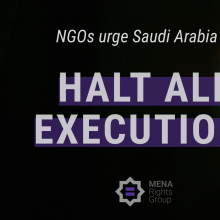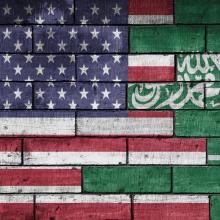March 26, 2024

Muttrah Corniche, Muscat, Oman © Lukas Bischoff Photograph, licensed under Shutterstock.
Ahead of the upcoming review in March, MENA Rights Group and the Oman Center for Human Rights and Democracy have warned the Sub-Committee on Accreditation that Oman’s national human rights institution (NHRI), the Omani Human Rights Commission (OHRC) fails to fulfill its mandate to protect human rights in the country. The NGOs urged the Committee to grant the OHRC with “B” status, to mark its lack of independence from the Omani government and its ineffectiveness.
Between March 25 and 29, 2024, the Sub-Committee on Accreditation (SCA) of the Global Alliance of National Human Rights Institutions (GANHRI) will examine the Omani Human Rights Commission (OHRC) and decide on its re-accreditation.
The SCA accreditation is based on a “peer-review” process to assess the compliance of national human rights institutions (NHRIs) with the Paris Principles, which set minimal standards that NHRIs must abide by “in order to be considered credible and to operate effectively.” The pillars of these principles are pluralism, independence and effectiveness. NHRIs must be independent from the government, represent and cooperate with civil society, and effectively promote human rights by monitoring violations and addressing them.
The OHRC was last reviewed by the SCA in November 2013 and was accredited with “B” status, marking its partial compliance with the above principles. Since then, MRG and the OCHRD have gathered credible and substantial information showing that the Omani NHRI does not sufficiently comply with these principles. Therefore, in a letter addressed to the SCA, we have urged them not to grant the OHRC status “A”.
First, the OHRC does not abide by the principle of independence. The Commission was created in 2008 by a unilateral Royal Decree enacted by the Sultan as he has the sole legislative authority. OHRC’s members are also directly appointed by royal decree, which means by the Sultan, without any external and independent oversight. The appointment process does not ensure that the selection is carried out with clarity and transparency, and there is no objective criteria, level of expertise and educational qualifications set. This clearly contradicts the Paris Principles and considerably undermines the independence of the Commission from the government.
This is especially reflected in the composition of the current OHRC. At least five of the current members have held previous governmental positions. For instance, the current Chairman had previously worked for the Omani Police and Prosecution. Moreover, the Deputy Chairman was a former attorney general in the Prosecution Office, and was identified as being the investigator in a case involving human rights defenders in 2012.
Regarding the effectiveness of the OHRC, the Commission has failed to protect human rights, notably the right to freedom of expression and the right to privacy. First, the OHRC has never formulated any recommendation to reform problematic pieces of legislation such as the Internal Security Service Law of 2020. This law gives unconstrained powers to the Omani security services to arrest and detain anyone for acts that fall under the legitimate exercise of freedom of expression. Second, the Commission never addressed the creation of the Cyber Defense Centre, under the guise of the Internal Security Service, which can access private individuals’ electronic devices.
Although the OHRC has established an online procedure for individual complaints of human rights violations in the country, civil society organisations reportedly received no response when they filed complaints on behalf of victims, including migrant domestic workers who have been subjected to dire conditions of living that could amount to torture.
Having cross-referenced the OHRC's annual reports with human rights violations in Oman reported by civil society, we can conclude that the Commission has failed to address them. In fact, Omani authorities, particularly the Internal Security Service, have targeted several human rights defenders, journalists and citizens. The OHRC has notably remained silent on the targeting of human rights defenders, journalists and citizens by Omani authorities. In March 2022, Moukhtar al-Hinai was arrested and charged under article 294 of the Omani Penal Code for tweeting about a corruption case involving government officials. In June 2020, activist and blogger Awadh al-Sawafi was arrested for tweets criticising the Omani government and was sentenced to one year in prison for violating the cybercrime law. Other cases include arrest in relation to an unpublished book, and imprisonment for articles criticising the judiciary and exposing government corruption. Critics also report widespread surveillance and several newspapers have been closed down or blocked, including Azamn and Mowatin (online). One emblematic case is that of activist Hassan al-Basham, who died in prison in April 2018, as a result of medical neglect, having been sentenced in 2016 for using “the Internet in what might be prejudicial to religious values” and “insulting the Sultan.”
The SCA should thus refrain from upgrading the status of the OHRC, and should, at the very least, re-accredit it with status B. The OHRC should demonstrate real independence in the exercise of its mandate and ensure that it remains neutral and impartial in all circumstances in order to benefit from the confidence of citizens and civil society as a whole.






